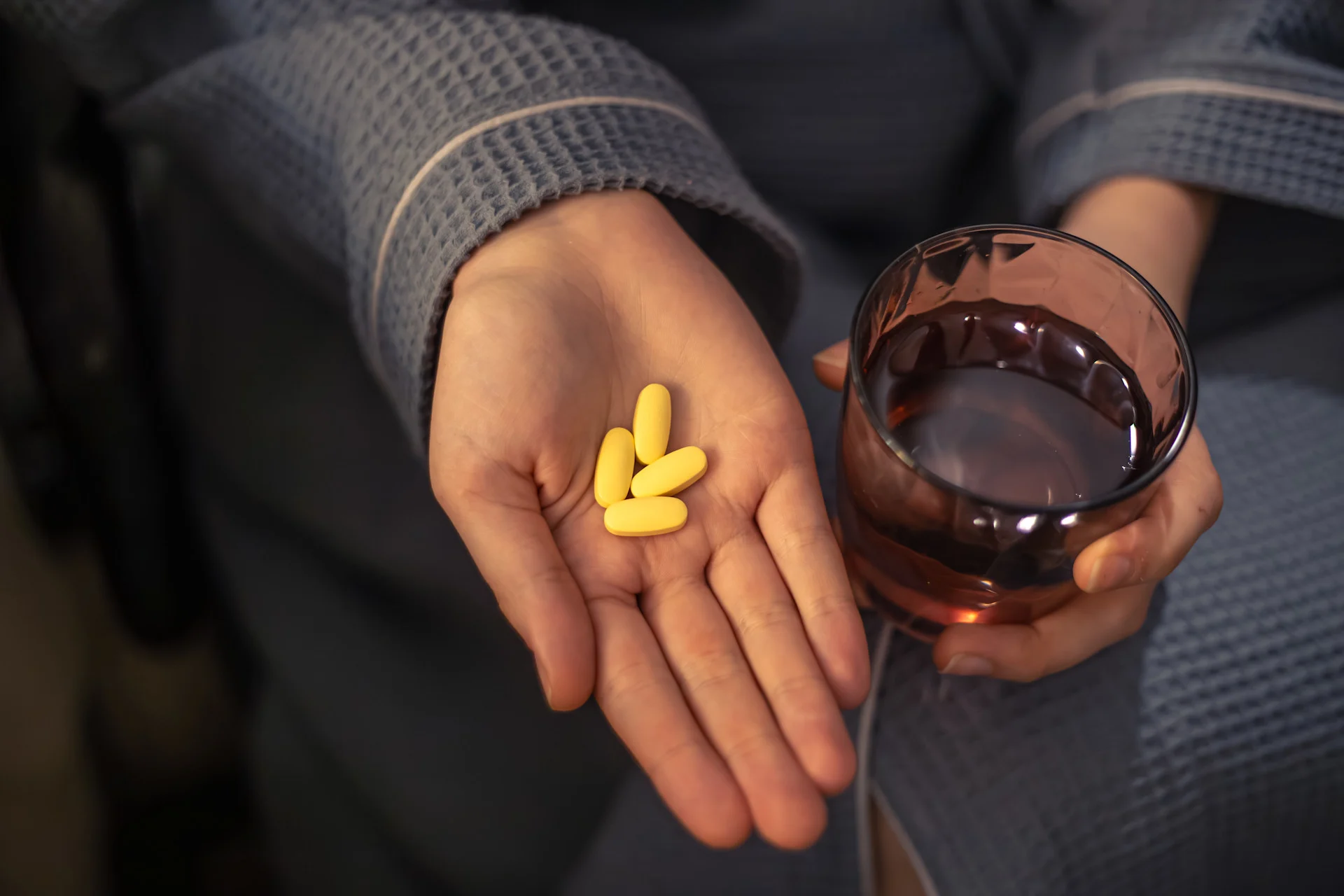Addiction Recovery - Drug and Alcohol
Zoloft and Alcohol

Mixing Zoloft and Alcohol can lead to serious side effects, worsen mental health, and hinder recovery. Learn the risks and how to protect your well-being.
Can I Have an Occasional Drink While on Zoloft?
It’s best to avoid mixing Zoloft and Alcohol. Even occasional drinking can increase side effects like drowsiness and dizziness. Alcohol may also reduce Zoloft’s effectiveness, potentially worsening depression or anxiety symptoms and interfering with your recovery process.
What Should I Do If I’ve Consumed Alcohol While on Zoloft?
Monitor yourself for side effects like dizziness, nausea, extreme drowsiness, or mood changes. If symptoms become severe—such as confusion, irregular heartbeat, or difficulty breathing—seek medical attention immediately. Avoid further alcohol consumption and consult your doctor about any potential risks.
Does Alcohol Consumption Affect Zoloft's Long-Term Effectiveness?
Yes, frequent alcohol use can weaken Zoloft’s therapeutic effects, making it less effective in treating depression and anxiety. Over time, this can lead to worsened mental health symptoms, increased mood instability, and a higher risk of relapse for individuals in recovery.
Are There Any Safe Alternatives to Alcohol for Relaxation While on Zoloft?
Yes, there are healthier alternatives to alcohol. Try herbal teas, meditation, yoga, deep breathing exercises, or engaging in enjoyable hobbies. Regular physical activity and social interactions can help you relax while supporting your mental well-being.
How Long After Stopping Zoloft Can I Safely Consume Alcohol?
The time frame varies based on individual factors, such as dosage and duration of use. It’s crucial to consult your healthcare provider before drinking alcohol after stopping Zoloft. Some individuals may need to wait weeks to ensure the medication has fully cleared their system.
Mixing Zoloft and alcohol can have serious consequences for your mental and physical health. Zoloft (sertraline) is prescribed to help manage depression and anxiety, but alcohol can interfere with its effectiveness and increase side effects.
Drinking while on Zoloft may lead to drowsiness and dizziness and even worsen depression or anxiety. If you're on the path to recovery, understanding how alcohol impacts your treatment is essential.
Whether you or a loved one are struggling with addiction or mental health challenges, knowing the risks can help you make safer choices and stay committed to a healthier future.
How Zoloft Works
Zoloft (sertraline) is a selective serotonin reuptake inhibitor (SSRI) commonly prescribed for mental health conditions such as depression and anxiety disorders.
It increases serotonin levels in the brain, a neurotransmitter responsible for mood regulation, emotional stability, and overall well-being.
When serotonin levels are low, individuals may experience symptoms of depression, anxiety, or other mood disorders. Zoloft helps stabilize mood by preventing the reabsorption of serotonin, allowing it to remain active in the brain for a more extended period. This process improves emotional regulation, reduces anxiety, and enhances mental health.
Common Conditions Treated with Zoloft
Zoloft is widely used to manage various mental health disorders, including:
Major Depressive Disorder (MDD) – Helps alleviate persistent sadness, loss of interest, and fatigue.
Generalized Anxiety Disorder (GAD) – Reduces excessive worry and tension.
Social Anxiety Disorder – Eases anxiety in social situations.
Obsessive-Compulsive Disorder (OCD) – Helps control intrusive thoughts and compulsive behaviors.
Post-Traumatic Stress Disorder (PTSD) – Reduces symptoms of trauma, including flashbacks and hypervigilance.
Panic Disorder – Helps manage sudden and intense episodes of fear.
While Zoloft is effective for many individuals, its effectiveness can be compromised when combined with alcohol.
Alcohol’s Effects on the Body and Mind
Alcohol is a central nervous system (CNS) depressant, meaning it slows down brain function and affects cognitive and motor skills. While some people drink to relax or experience temporary euphoria, alcohol can have significant adverse effects on mental and physical health.
Depressant Effects on the Central Nervous System
Alcohol affects neurotransmitter activity, leading to:
Slower brain function – Delayed reaction times, impaired judgment, and difficulty concentrating.
Mood instability – Temporary euphoria followed by irritability, depression, or anxiety.
Reduced coordination – Increased risk of falls, accidents, and impaired motor skills.
Short-Term and Long-Term Impacts on Mood, Cognition, and Physical Health
Short-term effects include drowsiness, dizziness, nausea, memory impairment, and lowered inhibitions.
Long-term effects can lead to dependency, liver damage, heart disease, and worsened mental health disorders.
Since alcohol alters brain chemistry, it can interfere with medications like Zoloft, increasing the risk of adverse effects.

We’re Here To Help You Find Your Way
Would you like more information about zoloft and alcohol? Reach out today.
Risks of Combining Zoloft and Alcohol
Alcohol use while on Zoloft is highly discouraged due to the increased risk of side effects, reduced effectiveness of treatment, and potentially life-threatening conditions.
Increased Side Effects
When taken together, Zoloft and alcohol amplify each other’s sedative effects, leading to:
Extreme drowsiness and fatigue.
Dizziness and lightheadedness.
Impaired coordination, making activities like driving dangerous.
Increased risk of blackouts and memory lapses.
Reduced Effectiveness of Zoloft
Furthermore, alcohol can counteract Zoloft’s benefits, making it less effective in treating depression or anxiety. Since alcohol itself can trigger depressive symptoms, it may worsen the very conditions Zoloft is meant to treat. Regular alcohol use can also lead to:
Increased mood swings.
Heightened anxiety levels.
Slower recovery from depression or other mental health conditions.
Serotonin Syndrome: A Potentially Life-Threatening Condition
Combining alcohol with Zoloft increases the risk of serotonin syndrome, a dangerous condition caused by excessive serotonin buildup in the brain. Symptoms include:
Agitation and restlessness.
Rapid heart rate and high blood pressure.
Tremors, sweating, and muscle rigidity.
Severe cases may lead to seizures or coma.
Impaired Judgment and Increased Risky Behaviors
Since both Zoloft and alcohol affect brain function, combining them can lead to poor decision-making and impulsivity. Risks include:
Engaging in reckless behaviors, such as unsafe sex or substance abuse.
Increased likelihood of accidents and injuries.
Emotional instability leads to conflicts or harmful situations.
Impact on Recovery
Hindrance to Mental Health Progress
Zoloft is designed to help stabilize mood and reduce symptoms of depression and anxiety. But alcohol can work against that progress, making recovery feel harder and more uncertain. Here are some of the ways alcohol may disrupt the benefits of treatment::
Increased Mood Swings – Alcohol disrupts serotonin levels, leading to greater emotional instability.
Heightened Anxiety & Depression – Alcohol can worsen symptoms of anxiety and depression, making recovery more challenging.
Disrupted Sleep Patterns – Alcohol can cause poor sleep quality, reducing the effectiveness of Zoloft and increasing emotional distress.
Risk of Relapse
For individuals recovering from substance abuse, alcohol can act as a trigger and lead to a relapse in addictive behaviors. Since alcohol lowers inhibitions and impairs judgment, it increases the likelihood of returning to past habits, such as drug use or excessive drinking. Common relapse risks include:
Loss of self-control – Alcohol impairs decision-making, making it easier to return to substance use.
Emotional Vulnerability – Alcohol can heighten stress, anxiety, and depression, leading individuals to seek other substances for relief.
Peer Pressure & Social Triggers – Being in environments where alcohol is present can make it harder to stay committed to sobriety.
Emotional and Physical Setbacks
Consuming alcohol while on Zoloft can have both emotional and physical consequences, delaying recovery and worsening overall health.
Emotional Setbacks: Increased feelings of sadness, irritability, and hopelessness.
Physical Setbacks: Higher risk of dizziness, nausea, fatigue, and potential liver damage when combined with medication.
Cognitive Impairment: Difficulty focusing, memory problems, and slower reaction times.
Avoiding alcohol while taking Zoloft is key to maintaining stability and long-term progress in recovery.

We’ll Lead You to New Heights
Do you have more questions about zoloft and alcohol? Reach out.
Recommendations for Individuals Taking Zoloft
If you are prescribed Zoloft and committed to improving your mental health, taking the proper precautions can help ensure a successful recovery journey.
Abstinence From Alcohol
It is strongly recommended to avoid alcohol entirely while taking Zoloft.
Even small amounts of alcohol can increase the risk of side effects, relapse, and worsening mental health symptoms.
For those in substance abuse recovery, staying alcohol-free is essential for long-term success.
Consultation with Healthcare Providers
If you are taking Zoloft and consider drinking alcohol, speak to your doctor first.
Your healthcare provider can provide personalized advice based on your medical history and treatment plan.
Be honest about your alcohol consumption to receive proper guidance and support.
Support Systems
Having a strong support system is essential for maintaining both mental health and sobriety. Consider:
Counseling & Therapy: A therapist can help you develop coping strategies to manage stress and avoid alcohol.
Support Groups: Programs like Alcoholics Anonymous (AA) or mental health support groups can provide encouragement and accountability.
Treatment Centers: If you struggle with alcohol dependence, professional rehabilitation programs can help you stay on track.
Struggling with Zoloft and Alcohol? We Can Help
If you're finding it difficult to manage alcohol use while taking Zoloft, know that help is available. Alcohol can work against your recovery, making it harder to feel stable and in control. But you don’t have to face that struggle alone. Support, treatment, and hope are all within reach.
At the Edge Treatment Center, we provide personalized treatment plans designed to support your recovery journey. Don’t let alcohol stand in the way of your progress—reach out to us today and take the first step toward a healthier, addiction-free life.

We’re Here To Help You Find Your Way
If you or a loved one is struggling with addiction, there is hope. Our team can guide you on your journey to recovery. Call us today.
Written by
The Edge Treatment Center
Reviewed by
 Jeremy Arzt
Jeremy ArztChief Clinical Officer
Addiction Recovery
Drug and Alcohol
June 12, 2025
